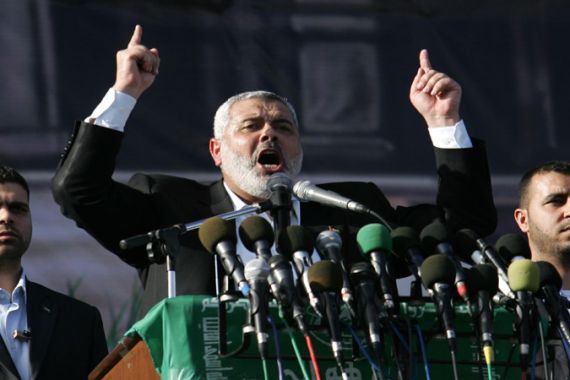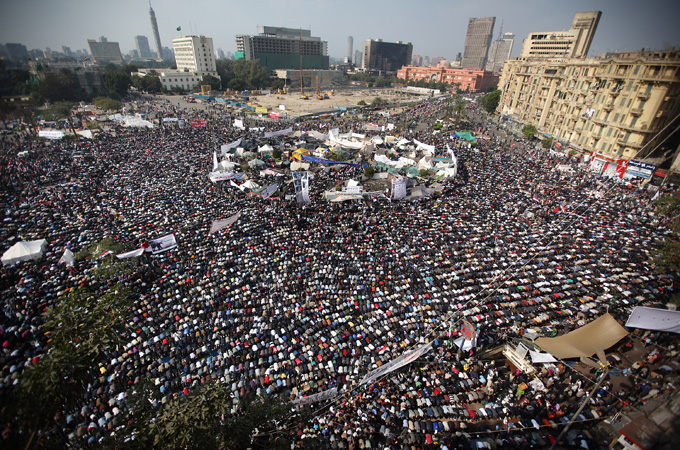Hamas and the Arab Spring
The Arab Spring is an opportunity to mend fortunes by rebranding Palestinian politics for statehood and good governance.

 |
| If ‘a Palestinian state sees the light of day’ over the next decade, ‘Cairo will have a hand in it’ [GALLO/GETTY] |
Exeter, United Kingdom – On a “win-loss” scale, Hamas features more as amongst the “winners” not “losers” of the Arab Spring. Ismail Haniyeh’s current diplomacy “shuttle” around several Arab capitals is designed, amongst other things, as a declaratory policy embracing the Arab Spring.
However, the embrace remains a little ill-defined around the edge, and faces many challenges.
The Arab Spring, like that “sudden” light, creating a desperately needed opening in a tunnelled Palestinian cause, illuminating the path for Haniyeh, amongst other chiefs of the Palestinian polity, including Fatah.
Haniyeh lands in Cairo around the same time in December three years ago when a buoyant Tzipi Livni more or less declared the war on Gaza with total indifference from Mubarak’s ousted Foreign Minister Ahmad Abu al-Ghait in December 2008. Maybe not by design, but the timing of Haniyeh’s visit is not without political symbolism.
No one can predict when Livni will get back to Cairo. But what is certain: Haniyeh’s visit will not be his last to Egypt’s capital.
Back to centre stage
So far, the Arab Spring in its Egyptian version has more or less rendered the Israeli siege on Gaza useless. Even the Israelis have joined in this and supplies from Israel enter Gaza. There is more mobility with the Rafah crossing enabling a freer flow of people and goods. What does not enter above the crossing, goes underground through the network of tunnels, the lifeline of Gaza during more than four years of embargo.
Hamas is no longer sandwiched between two equally hostile systems of barriers, security apparatuses and political schemes working in tandem to starve it of life. Here lies the significance of the Arab Spring for Hamas – to explore the new geography of freed Arab peoples endorsing justice for the Palestinian cause and lasting peace for all.
The Arab Spring geography will be largely populated by Islamist power brokers whose value-systems place the Palestinian cause amongst their political concerns, if not priorities. Just as some Western religious doctrines and establishments have grounded their support for Israel in the Bible, it is equally easier today for the rising forces of Islamism to justify their support for Palestine on Quranic grounds.
Whether the two groups will ever use the same grounds for finding just peace remains to be seen.
Egypt’s role
Tunisia may be the proud home of the Arab Spring, but Egypt – with political weight, historical pedigree and potential for geostrategic clout – will re-emerge in 2012 as the pivot of the Arab world. All routes to Palestinian statehood and peace-talks lead to Egypt.
The whole multi-levelled and complex diplomatic machine of a post-Mubarak Egypt will be put to work and to the test of the travails of the new horizons open up by the Arab Spring. If a Palestinian state sees the light of day over the next decade, Cairo will have a hand in it.
|
“The Arab Spring geography will be largely populated by Islamist power brokers whose value-systems place the Palestinian cause amongst their political concerns, if not priorities.“ |
If Haniyeh makes it to Tunis, he will be received as a hero, and the facilities and the reception once offered to Arafat during his years of exile in the 1980s could be founded as a gesture of unfettered support by all Tunisians to the Palestinian cause, in general, and Hamas, in particular. But it is in Cairo where the Palestinian cause will, from here on, be treated to more than the cordiality of like-minded society of Muslim brethren.
Egypt is already reclaiming its leading role as a hub of Arab diplomacy and soon it will be the house of a new Pan-Arabism founded by people and Arab voters. This bodes well for the Palestinians who, in varying degrees in different contexts, have reaped little in terms of benefits from the national-secular Arab autocratic establishments whose narrow and short-term interests excluded positive-sum diplomacy in favour of two-state solution, protection of Palestinian refugees, or the dilution of the Palestinians’ fundamental rights as stipulated in various UN resolutions.
The Muslim Brotherhood
Specifically, Egypt’s newly empowered Muslim Brotherhood (EMB), through free and fair elections, will stamp its diplomacy with more than the rhetorical championing of the Palestinian cause. Primarily, and this is the first significance of Haniyeh’s visist to Cairo, the Palestinian cause from here onwards will cease to be treated as a security file. It is a political file. This is the single most important pillar of Mubarak’s legacy that is being smashed to smithereens.
Hamas’ Brotherhood origins make the Islamist movement’s bond with the EMB uniquely inseparable. The two along with Jordan’s Muslim Brotherhood represent links in a common chain more than other branches of MB organisation, with the qualified exception of Sudan.
Hassan al-Banna’s legacy, including his famous epistles or rasa‘il, amongst other writings, accords Palestine a special status. Al-Banna deployed a great deal of his skill, resources, including correspondence with British diplomats and Egyptian politicians, to the Palestinian cause. This culminated in the EMB’s own war preparation effort begun in the early 1940s, and the commitment to battle between Arabs and Israelis of hundreds of fighters during 1947-48. To this end, he even formed the special apparatus (al-Jihaz al-Khass), which secretly trained EMB fighters independent of the government of the day.
Al-Banna’s view of Palestine, given the importance of Al-Aqsa Mosque, the second-oldest and third holiest shrine in Islam, with its location on the southern side of the Temple Mount, is that of a Muslim noble or blessed sanctuary. Thus, he deterritorialised the conflict from the 1940s, making the conflict over Palestine a Pan-Islamic responsibility. This view still prevails amongst the various brethren organisations all over the Arab Middle East.
Today, the EMB has progressed and revised many of its premises, but Al-Banna’s teachings persist, including his stance on Palestine. This does not at all mean that the region is about to rush to war and bloodshed. What it means – like in other spheres of combating corruption, addressing social justice and power-sharing – is that the EMB will deploy all the resources of post-Mubarak Egypt to lend a hand to regional and international efforts to find a solution to the dispossession and desperation of the Palestinians let down by national-secular rulers.
The Palestinian cause
The Arab Spring’s most evident outcome for the Palestinian cause is seeing it holistically as a political file and a question of justice crying for urgent attention. This is the moral and strategic depth the Arab Spring gives to the Palestinian cause, especially in an emerging geography where Hamas can mend its fortunes by finding political will in corridors of power dominated by Islamists.
Treating the Palestinian cause as a political, not security file, would mean three-pronged approaches. Firstly, to deploy soft power in the championing of the Palestinian cause, inclusively allowing for greater role by Arab civil societies to help the Palestinians – culture, education, infrastructure, law, governance, economic and development-capacity building.
|
“… Hamas must now favour the rise of a new context in which Palestinians favour the emergence of their own ‘Arab Spring’.“ |
Secondly, to enable Palestinians to reconcile – urgently and democratically – so that they acquire the means with which to push back against the spectre of tutelage to form a united polity that the Israelis and the quartet takes more seriously. Here, opening up Arab and Islamic space for the Palestinians to move freely, organise, raise funds, deliberate, lobby and build their case and a diplomatic machine to match, is what the Palestinians need. The only people who will deliver Palestine from occupation are the Palestinians themselves.
Lastly, through the Arab Spring openings and opportunities, the Palestinians have now to engage in a collective revision of past mistakes, reconciliation, stock-taking, and crystallisation and articulation of an emancipatory agenda to be taken to the world, including Israel, as their own vision for statehood and peace.
Palestinian ‘Arab Spring’
The Arab Spring geography favours Hamas. However, Hamas must now favour the rise of a new context in which Palestinians favour the emergence of their own “Arab Spring”. After all, it was the Palestinians’ intifada and uprisings that for so long inspired the oppressed Arab youth.
Integral to this must be rising above the current divides and engaging with Fatah in a spirit of genuine reconciliation. Fatah has over the years committed many mistakes, allowing outside patronage to derail the quest for statehood and compromise the value of Palestinian self-determination. No need to rehearse here the record of human riots violations – they are known to all, and Hamas is not without its own guilt on this front.
This is where the EMB and other Islamists can play a mediatory role to ensure the Palestinian house is in order before it faces the international community in full unison, shared values and common goals that transcend narrow ideological and partisan interests.
Favoured by the Arab Spring geography more than Fatah, Hamas must do two things: practice power-sharing with Fatah and work to this end. In the footsteps of other Islamists from Morocco to Egypt, power-sharing and pluralism are the name of the political game. Islamists need the liberals and the secularists to construct democratic order. It applies to the EMB, which has elevated it to an art in a short time span, and equally to Hamas.
Hamas knows its affairs better, and there are all kinds of hidden matters along the spectrum of political calculus, but now that it is almost entirely out of Syria, it should condemn the Syrian regime. Even if it may hang out in power for longer than expected, it is a doomed regime. Haniyeh, amongst other Palestinian leaders, has been clear about their support for the Arab Spring. Syria remains a difficult test, but one that requires a moral stand.
The Palestinians have for so long been left to a dire state of dehumanised existence at the mercy of local, regional and international political vicissitudes and whims.
The Arab Spring is both an opportunity for mending fortunes, and a test to rise to, by rebranding Palestinian politics for the tasks of statehood and good governance.
Larbi Sadiki is a Senior Lecturer in Middle East Politics at the University of Exeter, and author of Arab Democratisation: Elections without Democracy (Oxford University Press, 2009) and The Search for Arab Democracy: Discourses and Counter-Discourses (Columbia University Press, 2004), forthcoming Hamas and the Political Process (2011).
The views expressed in this article are the author’s own and do not necessarily reflect Al Jazeera’s editorial policy.
